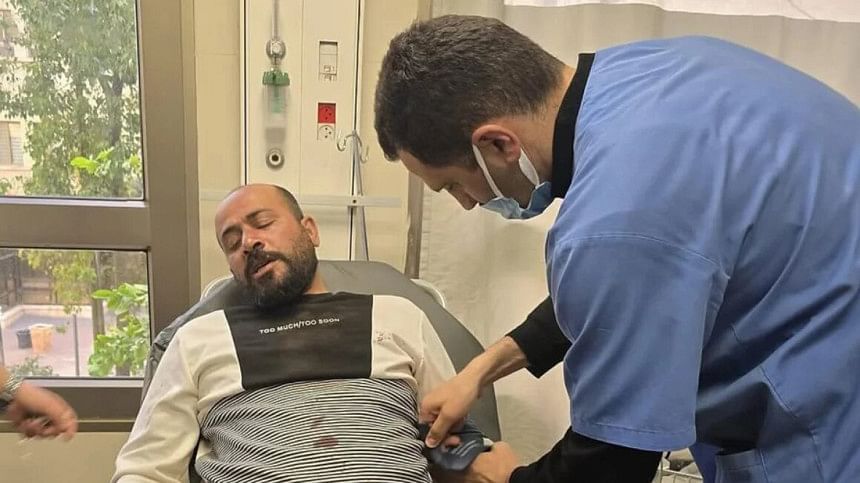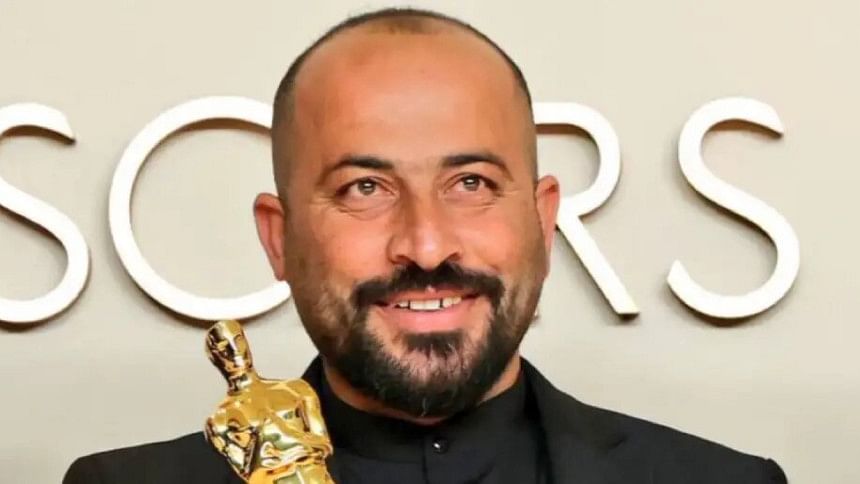Oscar-winning Palestinian director recounts brutal assault by Israeli troops
Just weeks after standing in the global spotlight at the Oscars in Los Angeles, where he accepted an award for “No Other Land”, a documentary chronicling the plight of his West Bank village– Palestinian filmmaker Hamdan Ballal now bears the physical scars of a brutal assault.
In an interview with The Associated Press on Tuesday (March 25), Hamdan appeared with a bruised face and blood-stained clothing as he recounted the harrowing ordeal. He alleged that an Israeli settler violently attacked him, kicking his head with force. The incident, he said, unfolded during a raid on his village and was followed by his detention by Israeli soldiers.
According to Hamdan, he and two others were blindfolded and held for over 20 hours, forced to sit on the cold floor beneath a freezing air conditioner. Throughout the night, as guard shifts changed, he claimed the soldiers routinely subjected him to beatings — with fists, boots, and sticks.
Though he does not understand Hebrew, Hamdan recalled repeatedly hearing his name mentioned alongside the word “Oscar.”
Speaking from a hospital bed in the West Bank following his release on Tuesday, Hamdan Ballal recounted the chilling realisation that he was being singled out. “They knew exactly who I was,” he said. “Even if I couldn’t understand the language, hearing ‘Oscar’ and my name made it clear.”
The Israeli military has yet to comment on the allegations that soldiers were involved in physically assaulting Hamdan. The man identified by Hamdan as the settler who initiated the attack — Shem Tov Luski, known to have previously issued threats against the filmmaker — denied all accusations.
In a statement to the Associated Press, Luski claimed that his vehicle had been pelted with stones by Palestinians and that neither he nor the soldiers resorted to violence. He also said he was unaware of Hamdan’s recent Oscar win.

According to the Israeli military, three Palestinians were arrested on suspicion of stone-throwing during the incident, along with an Israeli civilian who was promptly released. Hamdan maintains his innocence, firmly denying any involvement in the alleged rock-throwing.
The assault occurred on Monday (March 24) night in the village of Susiya, located in the contested Masafer Yatta area — the very region central to No Other Land. The documentary casts a stark light on the enduring struggle of Palestinian communities in the face of growing settler violence and the looming threat of military-led home demolitions.
As the sun dipped below the horizon and residents of the village prepared to break their Ramadan fast, a group of roughly two dozen Jewish settlers—accompanied by Israeli police—stormed the area, according to witnesses.
They reportedly hurled stones at homes and vandalised properties. Soon after, approximately 30 Israeli soldiers entered the scene. Meanwhile, members of an Israeli activist group, who were present to show solidarity with the villagers, shared video footage capturing their own vehicle being attacked by settlers wielding sticks and pelting it with stones.
One of the residents, Hamdan, said he began documenting the aftermath of the chaos using his phone. Concerned for his family’s safety, he retreated to his home and locked the doors, sheltering inside with his wife and three children. “I told myself, if I have to face death, I will do it protecting them,” he recalled.
Hamdan claimed that a man named Luski approached his home flanked by two soldiers. What followed, he said, was a brutal assault—Luski allegedly struck him on the head, knocked him down, and continued to punch and kick him as he lay on the ground. One of the accompanying soldiers reportedly used the butt of his rifle to hit Hamdan’s legs while the other held him at gunpoint.
From inside the house, Lamia Ballal, Hamdan’s wife, said she heard the horrifying sounds of the assault. “He was screaming, ‘I’m dying!'” she recounted.
In response, Luski offered a different version of events. Speaking to the Associated Press, he said he and other settlers had come to assist a fellow settler who had claimed he was under attack by Palestinian stone-throwers. Luski alleged that masked individuals—including Hamdan—had thrown rocks at his vehicle, smashing the window and hitting him in the chest with a stone.
He admitted to leading soldiers to Hamdan’s residence in an effort to identify him but denied laying a hand on Hamdan or taking part in any vandalism. Luski claimed to have recorded footage of the incident. However, when asked to provide it, he responded with a barrage of profanity.
By Tuesday, remnants of the violent confrontation lingered outside Hamdan’s home—a small smear of dried blood marked the spot, and the windows of the family’s vehicle lay shattered. Neighbours gestured toward a damaged water tank nearby, pointing out a gaping hole they claimed had been caused by the settlers.
Lea Tsemel, legal counsel for Hamdan and two other Palestinians arrested alongside him, stated that the trio had been taken to a military base, where they received only minimal medical assistance despite visible injuries from the incident. For several hours, she said, their legal team had no access to the detainees.
Hamdan recalled the disorienting experience of being blindfolded and transported to an unknown location. “I couldn’t see anything, I didn’t know where I was,” he said. “I was shivering from the cold under the air conditioning.”
Eventually, the three men were moved to an Israeli police facility located in the Kiryat Arba settlement in the occupied West Bank. They were released by Tuesday afternoon.
“I’m aching everywhere,” Hamdan told the Associated Press shortly after his release, limping on his way to a hospital in the nearby city of Hebron.
According to doctors, Hamdan bore multiple bruises and surface injuries, including a gash on his chin and abrasions beneath one eye, but no internal damage. The other two Palestinians detained with him were also reported to have sustained minor wounds.
A video that went viral in August captures a tense encounter between Hamdan and a group of masked settlers, among them Luski. The footage shows Luski hurling profanities at Hamdan, attempting to bait him into a confrontation.
“This land is mine—God gave it to me,” Luski declares in the video, before warning, “Next time, things won’t be so civil.” In a chilling moment, he threatens Hamdan with possible imprisonment at Sde Teiman, a controversial military detention facility known for holding Palestinians from Gaza.
The prison recently came under international scrutiny after five Israeli soldiers were charged with assaulting a detainee using a knife.
Luski’s taunts escalate as he speaks in Hebrew, referring to the assault as a “rape for a higher cause,” before mockingly blowing Hamdan a kiss.
The broader context of the region’s volatility is highlighted in “No Other Land”, a documentary co-created by Israeli and Palestinian filmmakers. The film focuses on life in Masafer Yatta—a cluster of rural villages in the southern West Bank, designated by the Israeli military in the 1980s as a live-fire training zone.
Despite ongoing eviction orders, roughly 1,000 residents, primarily Arab Bedouins, have remained. Military operations continue to raze homes, destroy water supplies, and uproot olive trees.
Encroaching settler outposts have only intensified the pressure. Local Palestinians and human rights groups say settler-led destruction of property often goes unchecked, with Israeli forces either ignoring the violence or siding with the settlers.
The film has provoked backlash both within Israel and overseas. In one high-profile instance, city officials in Miami Beach considered terminating a theatre’s lease after it hosted a screening of the documentary.
Basel Adra, a co-director of the film and a longtime Palestinian activist in the region, said the atmosphere has worsened dramatically since the film’s international recognition, including its recent Oscar win.
“The situation is bleak—in Gaza, in the West Bank, everywhere,” Adra said. “No one is stepping in to stop it.”
Israel took control of the West Bank, Gaza Strip, and East Jerusalem following the 1967 Arab-Israeli war. These territories are regarded by Palestinians as integral parts of a future independent state.
Israel has established more than 100 settlements across the occupied West Bank, now housing over half a million Israeli citizens. These settlements are widely deemed illegal under international law by much of the global community.
Meanwhile, around 3 million Palestinians in the West Bank remain under Israel’s ongoing military occupation. While the Palestinian Authority—supported by Western powers—oversees administrative duties in certain urban areas, it holds limited authority beyond that.
The ongoing war in Gaza has triggered an alarming escalation of violence across the West Bank. Large-scale military raids by Israeli forces have resulted in the deaths of hundreds of Palestinians and forced tens of thousands from their homes. Alongside these military operations, there has also been a sharp uptick in violence by Israeli settlers, as well as retaliatory attacks by Palestinians targeting Israelis.
LondonGBDESK//



Comments are closed.